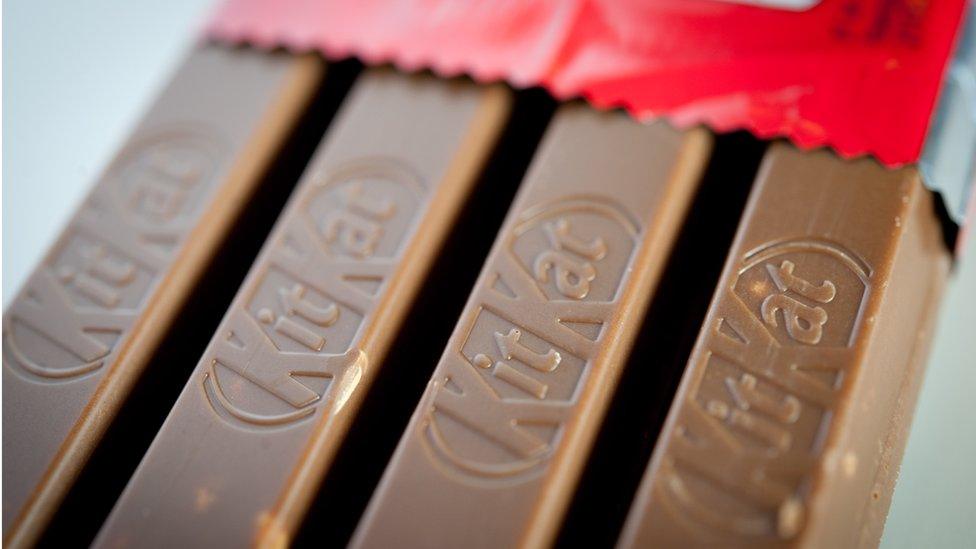KitKat maker Nestle hikes prices but sales still sweet
- Published
- comments

KitKat maker Nestle has hiked the prices of its products by almost 10% in the past year to offset a "significant" rise in costs.
Despite the increases, the world's biggest food firm still saw sales rise in the first three months of 2023.
It comes as UK shoppers continue to search for cheaper supermarket food.
Research firm Kantar said the squeeze on household budgets had led to more people turning to discount chains such as Aldi and Lidl.
The rate of grocery price increases slowed slightly in April, but consumers are still paying 17.3% more than this time last year, Kantar said.
But just because the inflation rate dipped, it does not mean prices are lower, it means they are not increasing as fast.
Many households are feeling the impact of rising prices in recent months, and inflation is also hitting the margins of businesses.
Kantar said rising prices had led to own-label sales in UK supermarkets jumping up 13.5% year on year, with the very cheapest value lines soaring by 46%, as households look to manage their budgets.
However, during times of economic hardship, sales of confectionary and other items such as cosmetics and alcohol, tend to be resilient due to a theory called the "lipstick effect", where shoppers buy themselves small, special treats instead of big-ticket items.
Nestle said sales of its confectionary worldwide increased in the past three months despite it increasing the prices of its more than 2,000 brands, which cover coffee, pet care, baby food, drinks, cereals and prepared dishes.
In the UK, the Swiss firm is best known for KitKat and Smarties, cereals such as Shreddies and Cheerios, Nescafe and Nespresso coffee, fizzy drink San Pellegrino, and Purina pet food.
Nestle's global sales rose by 5.6% to 23.5bn Swiss francs (£21.3bn) in the first three months of 2023.
"Nestle's showing just how important it is to have a strong suite of brands, which have allowed the consumer giant to push through some pretty hefty price hikes with little impact on volumes," said Matt Britzman, equity analyst at Hargreaves Lansdown.
Other major consumer goods companies have also been pushing up prices, although there are signs that the pace of these rises could be about to ease.
PepsiCo, where the average prices jumped 16% in the first three months of the year, said earlier this year that it was done raising prices, while rival Coca-Cola, where the average selling price rose 11%, has said only that it expects price increases to moderate over the course of the year, noting significant "uncertainty".
Consumer goods giant Procter & Gamble, maker of Pampers, Tide and Old Spice, which raised prices by about 10% at the start of the year, told investors that inflationary pressures were weighing most heavily on demand in Europe, were many buyers are switching to less expensive, store brand options.
- Published16 February 2023
